Thyroid supplements support the function of your thyroid, which is a small organ in your neck that produces hormones that are critical to maintaining healthy energy levels, weight, and mood.
A thyroid that’s overactive or underactive can create fatigue, weakness, tiredness, depression, and other mood disturbances.
While outright thyroid disease requires medical care, certain supplements can help keep your thyroid functioning optimally and improve both your physical and mental health.
We’ve reviewed and ranked the ten best supplements on the market for supporting your thyroid’s ability to produce hormones essential for staying fit, healthy, and emotionally stable.
Research
Rankings
1. Zhou Nutrition Thyroid Support
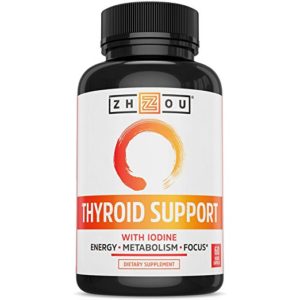
Zhou Nutrition Thyroid Support provides a wide range of nutrients to keep your thyroid function in top shape. First, it’s got iodine derived from Atlantic kelp, which is essential for synthesizing thyroid hormones.
In addition, it has a large dose of vitamin B12 to augment your energy levels, plus the trace minerals selenium, copper, manganese, and molybdenum—all essential for the proper function of the hormones in your body.
These are provided alongside herbal extracts like ashwagandha root powder, kelp, and cayenne pepper, which are thought to have hormone-supporting benefits as well. With all of these ingredients and very little in the way of fillers and artificial ingredients, it’s our top pick.
2. 1 Body Thyroid Support
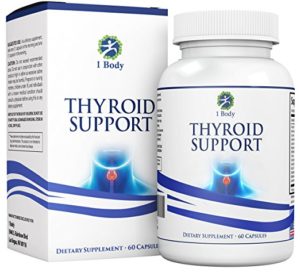
1 Body makes a thyroid supplement that’s focused on delivering high doses of the vitamins, minerals, and herbal extracts that best enable your thyroid to function at its best.
It has high doses of the trace minerals, and better yet, these trace minerals are provided in an amino acid chelate, which makes them far easier to absorb than the typical mineral salt form.
In addition, you’ll find herbal ingredients like kelp, forskolin, and ashwagandha root powder. This versatile and highly bioactive mix makes it a great choice.
3. Healths Harmony Thyroid Support
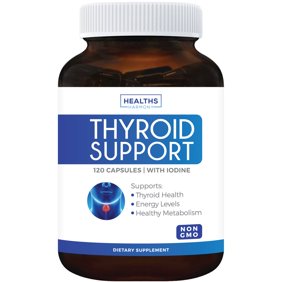
Healths Harmony makes a pretty comprehensive thyroid supplement that combines iodine with a range of trace minerals that support thyroid function.
These include the usual suspects: zinc, copper, and selenium, as well as some nice extras like manganese and magnesium. It also has some herbal compounds, like ashwagandha and black pepper extract for better bioavailability, but the main focus is on the mineral ingredients.
4. LES Labs Thyroid Support
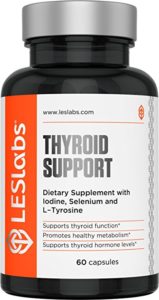
LES Labs Thyroid Support is the way to go if you just want to focus on the most important vitamins and minerals that directly enable thyroid function.
The only herbal extract included is ashwagandha, which is perhaps the best-supported herbal ingredient for thyroid function. Aside from that, the focus here is entirely on vitamins B, D, and E, as well as iodine and trace minerals that help your thyroid function properly.
5. Pure Encapsulations Thyroid Support Complex
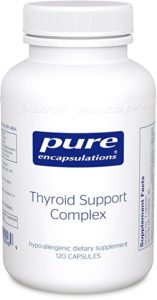
Pure Encapsulations targets thyroid function with a supplement that’s weighted more heavily towards herbal ingredients than vitamins or minerals.
It doesn’t have the wide range of ingredients that many other thyroid supplements have, but it does have a few herbal extracts you won’t find in many other thyroid supplements, like turmeric and guggul extract.
6. Optimox Iodoral
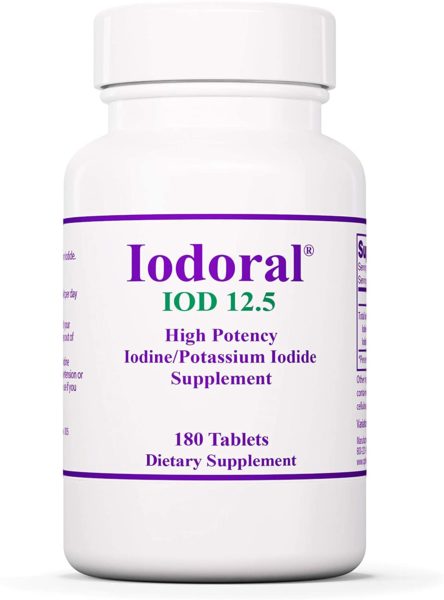
If your thyroid problems can be traced directly to a lack of dietary iodine, Iodoral is the supplement you need. It has a massive dose of iodine in two easily-absorbed forms.
It’s a good place to start if you don’t want to mess around with herbal extracts and high doses of B vitamins, but if you do need a more robust supplement to support thyroid function on multiple fronts, look elsewhere.
7. VitaStrength Thyroid Support Complete Formula
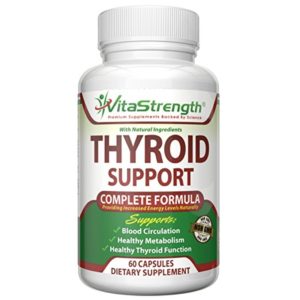
VitaStrength puts a lot of emphasis on vitamin and mineral ingredients in this thyroid supplement, which comes at the cost of fewer and lower doses of herbal extracts.
If you’d like to focus more on micronutrients and less on less well-understood herbal ingredients, it’s a decent supplement, but if you want the most powerful thyroid support supplement, it might not be the best choice.
8. ForestLeaf Thyroid Support
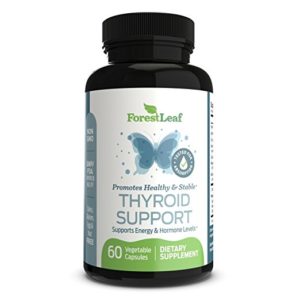
ForestLeaf has many of the typical thyroid support ingredients, like selenium, copper, and manganese, but the herbal ingredients are all mixed together into a “proprietary blend” which obscures exactly how much of each ingredient is in the supplement. This makes its efficacy more of a roll of the dice than the competition.
9. Women’s Health Network T Balance Plus
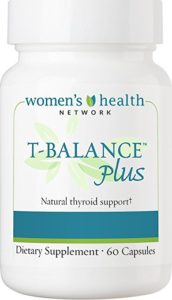
T Balance Plus is specifically formulated for women and has several herbal ingredients not found in other thyroid support supplements, like hops flower, sage leaf extract, and bacopa.
Unfortunately, it’s also missing some of the core ingredients for a thyroid support supplement. You won’t find any trace minerals like copper, manganese, or molybdenum, nor is there anything in the way of vitamins.
10. Nature’s Wellness Thyroid Support
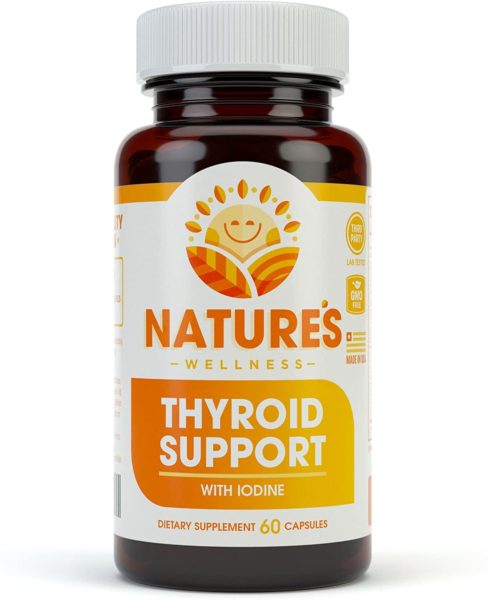
Nature’s way Thyroid Support contains an all-natural blend of minerals, vitamins, amino acids and herbs that are thought to be essential for thyroid hormone production.
It has a fairly well-balanced vitamin, mineral, and herbal extract profile, and while it’s not the most versatile, highest-dose, or cutting-edge thyroid supplement, it’s certainly effective for many people.
Category winners
Best thyroid supplement overall: Zhou Thyroid Support Complex
Zhou Thyroid Support features an excellent balance of vitamins, minerals, and herbal extracts that provide your body with all of the necessary precursors and building blocks for thyroid functions. Thanks to this diverse set of ingredients, it’s our top pick.
Best thyroid supplement for women: 1 Body Thyroid Support
1 Body is great for women thanks to its chelated forms of many of its ingredients. This formulation enables greater bioavailability of these nutrients, and ultimately better thyroid function as a result.
Best thyroid supplement for men: Zhou Thyroid Support Complex
For men, thyroid issues often coexist with testosterone issues: many of the same trace minerals support both thyroid hormones and androgens as well. That’s why we recommend Zhou Thyroid Support Complex, which has zinc, magnesium, selenium, and copper—all essential trace minerals for hormonal support for men.
Best thyroid supplement with iodine: Optimox Iodoral
High-dose iodine supplementation isn’t for everyone, but a subset of people with thyroid issues find that it’s a great way to rapidly increase their iodine levels. For this application, our recommendation is Optimox Iodoral, which provides an ultra-simple and potent dose of 12.5 mg of iodine per tablet.
Best thyroid supplement for weight loss: Healths Harmony Thyroid Support
Poor thyroid function can contribute to weight gain, and Healths Harmony takes this challenge head-on with dual-purpose ingredients like ashwagandha, vitamin B12, and cayenne pepper, which could help improve thyroid function as well as help with weight loss.
Best thyroid supplement from kelp: Nature’s Way Kelp
Want an all-natural thyroid supplement? Nature’s Way Kelp is the best option. This supplement contains 100% whole plant material from arctic kelp, which provides iodine along with the naturally co-occurring phytonutrients in kelp. With no synthetic additives or exotic extracts, it’s the best kelp-based thyroid supplement out there.
Who should buy thyroid supplements?
Thyroid supplements might be worth a shot if you want a supplement that provides the vitamins and minerals you need to support thyroid health. Thyroid function is delicate, though, so thyroid supplements should not be thought of as a replacement or substitute for prescription thyroid medication if you have diagnosed or suspected hypothyroidism or hyperthyroidism.
Some thyroid supplements contain herbal ingredients which could boost thyroid hormone activity, which is an undesirable side effect if you are already taking a thyroid medication. Thyroid supplements are better approached as tools to ensure that your thyroid has all of the building blocks it needs to function at full capacity.
That includes B vitamins, iodine, and other nutrients to produce thyroid hormones and keep your mood, energy levels, and weight stable. An ideal thyroid supplement should be something that allows you to maintain healthy thyroid function by providing your body with all of the ingredients it needs to both produce and regulate your thyroid hormone levels.
Too often, people think of thyroid supplements as an over the counter method to try to address hypothyroidism, but that should stay in the domain of prescription thyroid medication, because once you have thyroid problems, it can be very difficult (even with regular blood testing and careful adjustment of prescription medication dosages) to get your thyroid hormone concentrations to stay within the narrow window of normal levels.
How we ranked
Because of concerns about potentially active forms of thyroid hormone in thyroid supplements, we focused our ranking criteria on ingredients that provide the possibility for thyroid benefits with a lower (though not zero) potential for risk.
That meant a primary focus on ingredients like iodine and B-vitamins, as well as zinc, copper, and other trace minerals. We de-emphasized herbal extracts like ashwagandha, as the direct effects of these supplements on thyroid function have only been tested in animal studies, not human studies.
For iodine, we were looking for doses that would help the average person get into the recommended intake range of 150 to 225 mcg of iodine per day, but not so much iodine that your daily intake would exceed the upper limit of allowable intake—that would be 1100 mcg per day.
With B vitamins, the upper limits weren’t as important, since most of the B complex vitamins do not have harmful effects at doses higher than the recommended intake. Instead, we judged supplements on whether they provided a wide range of B vitamins at an effective dose.
Beyond just iodine and B vitamins, we also looked for trace minerals like selenium, copper, and zinc. Some research, discussed later in this article, has found that deficiencies in these trace minerals could contribute to poorly regulated thyroid function.
Each of these minerals has recommended intakes, which we used to develop guidelines for evaluating how well each potential candidate for our list provided these trace minerals.
Lastly, we applied our usual criteria for purity and clean supplement design. We were looking for supplements with a minimum of extraneous ingredients like binders or anti-caking agents (e.g. silicon dioxide or magnesium stearate).
Vegetarian-friendly cellulose capsules were slightly preferably to animal-based gelatin capsules, to broaden the accessibility of the supplements on our list, though this was not a dealbreaker. Other markers of quality, like following good manufacturing processes, were also pluses in this category.
Our final rankings were a weighted average of the compounds included, dose efficacy, and indicators of clean supplement design. These are the best thyroid supplements available right now if you are looking to provide your body with the nutrients it needs to support thyroid function.
Benefits
Thyroid supplements help give your body the nutrients it needs to support the function of your thyroid. The thyroid is a relatively obscure organ that plays a critical role in regulating your weight, mood, and energy levels.
The thyroid pumps out critical hormones that stabilize everything from your weight to your mood to your energy levels throughout the day.
Suboptimal thyroid function can manifest as fatigue, listlessness, irritability, weight gain, depression, anxiety, and other general, nonspecific health complaints.
If thyroid function deteriorates, you can even end up with hypothyroidism, a medical condition that requires taking prescription thyroid hormones.
Even if this isn’t the case, you can still benefit from a supplement that ensures your thyroid is functioning in optimal condition.
A supplement with iodine can improve your thyroid function. Iodine, a trace element that is lacking in many people’s’ diet, is linked directly to thyroid function.
It’s a necessary precursor for the production of thyroid hormones, and when iodine intake is not optimal, thyroid problems can be the result. This was the conclusion of a scientific review published by by Hye Rim Chung at Seoul National University in Korea (1).
In it, Chung reviews a raft of evidence that suggests that insufficient intake of iodine can cause thyroid problems. In children, excess iodine intake can cause thyroid dysfunction too, though in adults high thyroid intake does not appear to pose risks, according to the Office of Dietary Supplements at the National Institutes of Health (2).
If you think your thyroid function is not as strong as it should be, iodine intake is the first place you should look.
Including ashwagandha in a thyroid supplement could directly increase thyroid hormone concentrations. So far, research on herbal extracts and thyroid function has been in the early stages, but some animal-based studies have suggested that ashwagandha could have a potent effect on thyroid function.
A paper published in 2011 in the Journal of Pharmacy and Pharmacology examined the effects of administering ashwagandha extract to lab mice (3).
After 20 days of administering ashwagandha extract to the mice, the researchers found that levels of T3 and T4 thyroid hormones increased significantly. In addition, the supplement also appeared to have a protective effect on the mice’s liver function.
The trace mineral selenium is particularly important in a thyroid supplement. Selenium, an obscure element found only in trace amounts in most foods, plays an outsized role in thyroid function.
According to research by a team of endocrinologists in Germany, selenium protects thyroid cells during the thyroid hormone manufacturing process (4). One step of the thyroid hormone synthesis process creates hydrogen peroxide as a byproduct, which is highly destructive if not dealt with.
Selenium fills this role, keeping thyroid synthesis moving smoothly. Among the organs of the body, the thyroid gland has the highest concentration of selenium, which underscores its importance.
Some research has even traced thyroid deficiency directly to low levels of selenium. A paper published in 2001 cited research that suggested that mood disruption and impaired cognitive function, common symptoms of thyroid dysfunction, can be linked to low levels of selenium (5).
This problem is particularly acute in regions that have low selenium levels in the soil. Research published in the American Journal of Epidemiology drew a direct correlation between selenium levels in the body and cognitive performance among elderly people in China (6).
In this study, the people with the highest selenium levels had the highest levels of cognitive functioning, a relationship which was likely mediated in large part by thyroid function.
Other trace elements, like copper and zinc, are also essential for proper thyroid function. This was the recommendation of a review paper published in the British Medical Bulletin by John Arthur and Geoffrey Beckett, two researchers in the United Kingdom (7).
While the function of trace minerals like zinc, copper, and iron is not as well-understood as the role of selenium when it comes to thyroid synthesis, it’s nevertheless clear that they play a critical role. When people are deficient in these trace minerals, they start to manifest all of the problems associated with poor thyroid function.
Soy protein could interfere with your absorption of thyroid-affecting compounds. The degree to which other popular nutritional supplements affect thyroid hormone function is not a well-studied area of research, but one case report published in 2001 in the journal Endocrinology Practice illuminates an interesting possible interaction between thyroid hormones and soy protein (8).
The authors describe the case of a 45 year old woman who was seeing a team of endocrinologists to figure out the right dosage to regulate her thyroid hormone levels after getting her thyroid removed for a cancerous growth. The doctors noticed that the woman’s thyroid levels were unusually difficult to control, even after trying a wide range of doses of thyroid medication that was intended to deliver different amounts of thyroid hormones.
After some investigation, they discovered that the woman was taking her thyroid medication at the same time as a soy protein shake.
The medical team suspected that there was a link between soy protein and the thyroid medication that the woman was taking, so they instructed her to avoid taking her soy protein within a few hours of taking her medication. The strategy worked—the woman’s thyroid levels responded much better to medication.
In the discussion section of the article, the researchers hypothesized that there may have been some biochemical reaction between compounds in the soy protein and the thyroid hormones the woman was taking.
Not much follow-up research has been done to try to figure out exactly what interaction is going on between thyroid hormone and the compounds in soy protein, but just based on these results, it might be wise to separate any soy-protein based supplements from any thyroid-affecting supplements, just to be safe.
While it’s not likely that the same interference in absorption extends to vitamin, mineral, or herbal ingredients that may support thyroid function, it’s pretty easy to spread out your dosage of soy protein and a thyroid supplement.
This information is also useful to know if you do take actual thyroid medication–in this case, definitely don’t mix soy protein and your prescription thyroid medication.
Side effects
With hormones as influential as those produced by the thyroid, a supplementation strategy focused on altering thyroid function is necessarily a bit complex. While excessive intake of iodine is unlikely to be a problem for adults, it can cause thyroid dysfunction in children (just like thyroid insufficiency can) (9).
Ashwagandha, one of the most effective herbal ingredients for thyroid supplements, can also cause problems if taken in excess.
One case study presented by a team of doctors in the Netherlands discussed a woman who reported to the hospital with excessive thyroid hormone levels, which were associated with an ashwagandha supplement the woman had recently started taking (10).
In this case, it appears the supplement worked too well: high thyroid hormone levels can cause problems just like low thyroid hormone
Recommended dose
When looking for a thyroid supplement, you should ensure that the dose of iodine is sufficient to protect deficiency.
The National Institutes of Health recommends 150 micrograms of iodine per day for both men and women, and this demand increases to 220 micrograms per day for women who are pregnant and 290 micrograms per day for women who are breastfeeding (11).
When it comes to selenium, you should make sure your thyroid supplement includes at least 55 micrograms per day (12).
Like with iodine, recommended levels increase for women who are pregnant or breastfeeding, to 60 and 70 micrograms per day, respectively.
Herbal ingredients are harder to prescribe direct dosages for, given that the research is still emerging on their efficacy, but with ashwagandha, you should avoid high doses when you initially start taking a thyroid supplement.
FAQ
Q: What should be in a thyroid supplement?
A: When it comes to supplying your body with the compounds it needs for optimal thyroid health, the top ingredients you should be on the lookout for are iodine, selenium, zinc, and copper.
All of these nutrients have been connected with thyroid function in some way in scientific research. Iodine deficiency is known to be linked to thyroid problems, but make sure there isn’t too much iodine in your thyroid supplement either: overloading on iodine (daily intake above 1100 mcg per day, according to the National Institutes of Health Office of Dietary Supplements) can be just as bad as not getting enough iodine.
Similar caveats apply to trace metals like selenium, zinc, and copper, but heavy doses of these compounds are far less common in thyroid supplements.
Q: Are thyroid supplements good for hypothyroidism?
A: If you have diagnosed hypothyroidism, you should work with your doctor to find a dosage of thyroid medication that controls your thyroid levels first.
Medical doctors caution that some thyroid supplements are known to contain biologically active amounts of thyroid hormones, but that these hormone levels are unregulated and could put your thyroid levels out of the optimal range (13).
Any supplementation regimen should be cleared with your doctor first, and that is especially true of thyroid supplements because of their potential to interact with or mimic thyroid medication.
Q: Can a thyroid supplement cause weight gain?
A: It’s unlikely for a thyroid supplement to cause weight gain directly, but it’s possible that changes in thyroid function that are brought about by a thyroid supplement could cause weight gain.
Some herbal compounds, like ashwagandha, are thought to change thyroid hormone levels, at least according to animal studies. So at least in theory, a thyroid supplement that contains ashwagandha could cause weight gain (or weight loss, depending on your current thyroid level) but these changes are entirely hypothetical.
Incidentally, ashwagandha is actually found in many supplements for weight loss, due to its potential ability to modulate the body’s energy regulation.
If you think your thyroid supplement is causing weight gain, you should discontinue using it and see your doctor to make sure that your thyroid levels are not being negatively affected by your supplementation routine.
Q: Can you take a thyroid supplement alongside levothyroxine?
A: Doctors caution against taking thyroid supplements at the same time as levothyroxine, which is a prescription strength thyroid hormone.
Thyroid supplements could interact with thyroid medication like levothyroxine in potentially unpredictable ways. It’s difficult enough as it is to dial in the dosage of thyroid medication like levothyroxine, so you definitely should not start a thyroid supplement unless you’ve talked with your doctor.
Some research has even found that thyroid supplements can contain some of the same active ingredients as prescription thyroid medication like levothyroxine, which could drastically alter the efficacy of your prescription medication routine (15). It’s important not to confuse or mix thyroid supplements and prescription thyroid medication.
Q: Can you lose weight using a thyroid supplement?
A: Some ingredients in popular thyroid supplements—most notably ashwagandha—are found in natural weight loss supplements as well, though typically in different amounts and alongside other ingredients.
Some compounds found in thyroid supplements, like iodine, copper, and selenium, have no known relationship to weight loss, and are not found in top weight loss supplements.
If you are specifically looking for weight loss, it may be better to take a supplement that is specific to weight loss as opposed to hoping to get weight loss benefits from thyroid medication.
Q: What vitamins are good for your thyroid?
A: In terms of vitamins specifically for the function of the thyroid, there is some circumstantial evidence that the B vitamins play an important role in the function of the thyroid.
People with certain medical conditions have lowered vitamin B levels and also disrupted thyroid function; however, supplementing with B vitamins does not necessarily address the thyroid dysfunction (16), so it is not clear if this connection is merely coincidental.
Though they are not technically vitamins (they are instead minerals), iodine, zinc, copper, and selenium are all important for maintaining proper thyroid function.
Q: What foods can help your thyroid?
A: The best foods to ensure proper thyroid function are those that provide your body with the building blocks and key compounds it needs for thyroid hormone production and regulation.
Foods that are good for you thyroid include those that provide the essential trace nutrients and minerals that the thyroid needs to function.
This includes fish, oysters, and kelp (which all provide high levels of iodine); spirulina, mushrooms, almonds, spinach, and broccoli (which provide copper and zinc); and eggs, brown rice, and whole grains (which provide selenium).
Fortunately, pretty much all of these foods are part of a healthy overall diet, which makes it easy to design your daily eating habits to support proper thyroid function.
Q: How are thyroid supplements different from thyroid medication?
A: Thyroid supplements are fundamentally different from thyroid medication—thyroid meds like levothyroxine are synthetic replacements for thyroid hormones, which are often needed by people with thyroid disorders to prevent the symptoms of hypothyroidism.
On the other hand, thyroid supplements are intended to provide vitamins and minerals that support your body’s ability to maintain healthy thyroid functioning.
Unfortunately, some unscrupulous thyroid supplement manufacturers have been found putting thyroid hormones in their thyroid supplements, which causes major problems for people who are taking thyroid supplements and who actually have thyroid problems (16).
Even without another source of thyroid hormone, dialing in proper dosage of thyroid medication is notoriously difficult. If a thyroid supplement is altering your thyroid hormone levels as well (in an unpredictable and inconsistent way to boot), it can be almost impossible to get optimal thyroid hormone levels.
That’s why we always recommend talking with your doctor before you use a thyroid supplement, particularly if you think you already have thyroid problems.
Related articles
Recap
Thyroid supplements can provide the vitamins and minerals your thyroid gland needs to produce the right levels of thyroid hormone.
The wide range of functions of thyroid hormones mean that poor thyroid function can affect everything from your weight to your mood to your cognitive function. Trace elements like iodine, selenium, copper, and zinc appear particularly important when it comes to thyroid function.
The herbal extract ashwagandha is very well-suited for increasing production of thyroid hormones, but large doses taken on a regular basis might cause your body to produce too much thyroid hormone. It’s better to focus on vitamin and mineral compounds.
With the right formulation, a thyroid supplement can improve your physical health, cognitive function, and emotional well-being.
For BodyNutrition’s #1 thyroid supplement recommendation, click here.